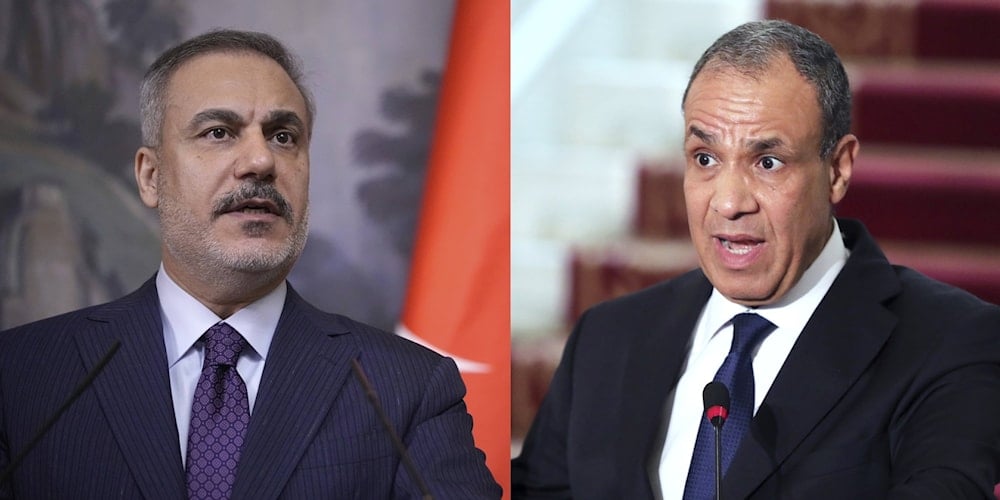Turkey, Egypt discuss Gaza aid, ceasefire talks: Reports
Turkey and Egypt are coordinating efforts to push for a Gaza ceasefire amid a deepening humanitarian crisis.
-

Turkish Foreign Minister Hakan Fidan (Left) held a phone call with Egyptian counterpart Badr Abdelatty (AP collage)
Turkish Foreign Minister Hakan Fidan and his Egyptian counterpart Badr Abdelatty held a phone call on Sunday to address the rapidly deteriorating humanitarian situation in Gaza and coordinate joint efforts to facilitate a ceasefire, according to a source from the Turkish Foreign Ministry speaking to RIA Novosti.
"Today, Foreign Minister Hakan Fidan held a phone conversation with Egyptian Foreign Minister Badr Abdelatty," the source stated.
The discussion reportedly centered on the urgent need to accelerate humanitarian aid deliveries to Gaza, where "Israel’s" prolonged blockade has pushed hundreds of thousands into famine. International organizations including the United Nations and the World Health Organization have repeatedly described the situation as a full-scale "humanitarian disaster," with minimal access to food, water, and medical care. Despite intermittent Israeli "tactical pauses" and limited airdrops of aid, UN officials insist that these measures are symbolic at best and fall drastically short of meeting the needs of Gaza's besieged population.
Both ministers also examined avenues to align diplomatic efforts and build momentum toward a lasting political solution. Cairo, which has played a leading role in negotiations alongside Qatar, continues to serve as a primary conduit between Hamas and other international actors, including the United States. Turkish officials, who maintain open lines of communication with Palestinian factions, stressed the need for regional consensus and coordinated pressure on all parties to push toward a ceasefire.
Ceasefire talks undermined
The call came just days after the United States and "Israel" withdrew their negotiators from indirect talks in Doha on July 24, claiming Hamas had failed to present a unified position or demonstrate seriousness. The Palestinian resistance movement immediately rejected the accusations. In a statement released on July 25, Hamas reaffirmed its commitment to "serious and responsible" negotiations and said its latest response to the ceasefire proposal was crafted in consultation with all Palestinian factions and key regional mediators.
Hamas noted that its proposals focused on securing the steady flow of humanitarian aid, clarifying maps of Israeli military withdrawal, and obtaining international guarantees to prevent further aggression. According to Palestinian sources, the movement objected to recent revisions in the US-backed proposal, which slashed a previously agreed 60-day truce down to a single week, offered no concrete commitments on prisoner exchanges, and ignored calls for long-term reconstruction or the lifting of the siege.
In an effort to keep negotiations on track, Egypt and Qatar issued a joint statement on July 25 asserting that "tangible progress" had been made during the most recent round of talks. Turkish diplomatic sources confirmed that Egypt briefed Ankara on the latest developments, underlining the importance of coordinated regional action to push the process forward.
Read more: Ex Shin Bet official: Hamas will never surrender, even after 100 years
Disarmament denied
Meanwhile, Turkey has rejected reports claiming it demanded Hamas disarm or release captives as a precondition to progress. According to a Turkish source speaking to RIA Novosti on August 2, Turkey’s position, expressed at the recent UN international conference on Palestine in New York, was misrepresented. Ankara clarified that while it supported a comprehensive ceasefire framework, any disarmament by Hamas would only be considered in the context of the establishment of a fully sovereign Palestinian state backed by international guarantees.
Hamas, for its part, dismissed rumors of willingness to disarm, reiterating that armed resistance is a lawful response to occupation and remains a non-negotiable right until full national liberation is achieved.

 4 Min Read
4 Min Read








